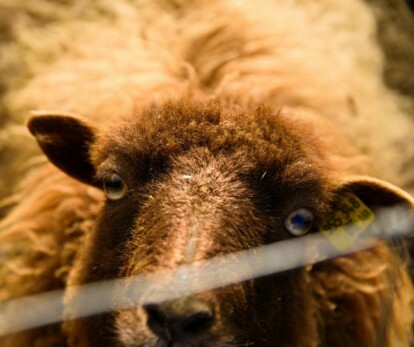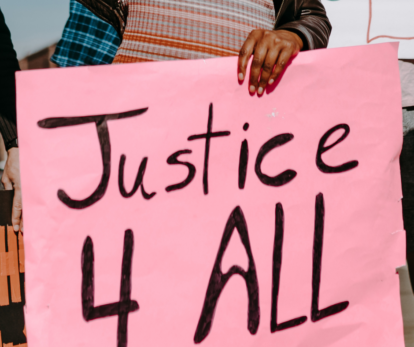Investigation into the RSPCA Assured scheme reveals widespread animal suffering


As a vegan, have you ever had anyone say to you that “You care more about animal rights than you do human rights”, or that we should be focusing activism on human rights as a priority, then think about animal rights?
Maybe you’ve spoken to people who feel it’s problematic to compare the rights of our fellow animals to the rights of marginalised humans.
There are compelling reasons why some people feel that the mainstream vegan narrative about animal freedom, climate change and physical health is steeped in (predominantly white) privilege. They believe it ignores the voices of Black or Indigenous people, People of Colour or the impoverished, all of whom disproportionately suffer the consequences of colonialism, industrial-scale animal agriculture and environmental destruction.
Others believe mainstream veganism to be performative, given that corporate food giants frequently exploit indigenous farms and farmers to produce crops such as chickpeas, quinoa, avocado and cashews.
At Ethical Globe, we acknowledge the above opinions and understand that these are incredibly complex, sensitive and nuanced issues. We also strongly believe that human rights and the rights of our fellow animals are deeply interconnected and necessary parts of the same conversation.
Indeed, we believe our oppression and exploitation of humans and other animals enable and compound each other (see David Nibert’s excellent book ‘Animal Rights/Human Rights Entanglements of Oppression and Liberation’ for a deep understanding of this concept). For example, the world’s food systems, many of which harm other animals on an industrial scale, enable gross inequalities and exploitation of marginalised humans, from claiming ancestral lands to creating water and food scarcity, contributing to climate change, creating demand for trafficked workers, poverty and more.
We believe that we will never have a world free from human exploitation if we allow the exploitation of other animals to continue.
Today’s blog explores why.
From the moment most humans are born, we begin absorbing speciesist messages that all other life on the planet is a resource for human use, including other animal species. Think about the language humans use: kill two birds with one stone, bring home the bacon, flogging a dead horse, be a guinea pig. All of these idioms position animals as things to be used or killed; many of them describe acts of violence.
Other animals are legally viewed as things, as property for humans to own. Most people routinely refer to individual animals as “it” instead of “he/she/they” until they know more about them and even sometimes when they do know more about them!
From infancy onwards, we learn that there are animals to eat, animals to entertain us, animals to clothe us, animals to use as test subjects, and animals who live as our companions.
As we learn to view the world in this way, we learn that life on Earth has a hierarchy, a pyramid of rights, with humans sitting at the pinnacle. In turn, we learn that we can take what we want from all of the species we view as below us, including their lives.
We’re taught that it’s acceptable to slaughter 70 billion of our animal kin every single year for their flesh and secretions and that as many as three trillion fishes are killed per year for human consumption. The numbers are so large that it’s almost impossible to comprehend the scale of suffering and death. And many humans are able to justify it as unfortunate but necessary. After all, aren’t some animals meant to be food? Lions don’t consider the rights of their prey when they hunt.
And so unimaginable slaughter continues, growing year on year.
There’s a strong argument that this is the first form of discrimination most of us learn, providing a blueprint for subsequent prejudices.
Speciesism has a powerful role to play in human oppression. It establishes the status quo, that it’s the “norm” to exploit our animal kin because they are “less than” human.
As a social species, most of us inherently believe that it is wrong to hurt, degrade or kill other human beings. But many people can justify doing those things to other animals because we’ve been taught that it’s acceptable.
In his book Less Than Human, philosophy professor David Livingstone Smith highlights that speciesist language is frequently used to dehumanise specific groups of people. In turn, this “subverts the inhibitions” that would normally stop us from turning on our own species.
Words such as “brute”, “swarm”, “plague”, “lice”, “vermin”, “rat (cheat/liar)”, “dog (cheat/pester)”, “pig (glutton/ignorant)” or “snake (untrustworthy)” are just a few of the words that we collectively associate with animals.
When these same words are used to describe our fellow humans, it begins a process of dehumanisation.
Once a group of people has been dehumanised, people outside of that group can be persuaded to “other” them, to see the dehumanised group as “less than” human, “subhuman” or “little more than animals”.
It’s an insidious process that has underpinned many of humanity’s greatest atrocities towards its own kind. As Syl Ko argues, ‘the colonial invention of the “animal” has been imposed onto both humans and other animals and has resulted in the oppression of mainly minority human populations and our fellow animals’. As such, we need to stop ‘animalising’ both humans and other animals (to learn more about animality and the connections between racism and speciesism, check out Aphro-ism by Aph and Syl Ko).
Many vegans believe that if we can teach people from birth onwards that our animal kin deserve freedom, equal consideration of interests and that they do not exist to be exploited, then those people will never have a moral justification for violence towards animals.
And if we believe that violence to animals is immoral, how can we ever justify violence towards members of our own species?
A straightforward way that veganism intersects with many human rights movements is because where there is violence towards other animals, there is violence towards humans.
Consider the world’s slaughterhouses – positions are hard to fill, so often employ the most vulnerable in society. Indeed, slaughterhouse workers are more likely to come from marginalised groups than in other industries.
Criminal groups are known to traffic slaughterhouse workers. Physical injuries – including life-changing amputations – are commonplace, as are mental health problems such as post-traumatic stress disorder (PTSD) and perpetration-induced traumatic stress (PITS).
Slaughterhouse workers often become isolated, more prone to drug and alcohol abuse, depression, anxiety, paranoia and disassociation, and have a higher propensity towards domestic violence. Their families and communities suffer as a result. Workers are low-paid and may not have the means to complain about health and safety due to issues such as illiteracy, language barriers or being financially trapped without prospects of a better job.
Many vegans believe that if we can remove animals from our food systems, we can also dismantle the systems that oppress and exploit so many humans.
Much of the narrative around veganism focuses on the environment and animal freedom. Still, the reality is that these issues are deeply intertwined with issues of colonialism, racism, white supremacy, gender, class, disability and accessibility, and other inequalities.
Animal agriculture has stripped indigenous people of their lands. Food poverty is widespread, with 40% of people in the UK unable to afford a healthy diet and one in 10 people experiencing life-threatening hunger. Worldwide, women and girls are the most at risk of becoming malnourished. We have enough food to feed everyone on Earth, but currently, a third of the world’s cereals are used as feed for farmed animals and two-thirds of the industrialised world’s agricultural land is used to grow cereals for feed.
We know that animal agriculture is one of the greatest contributors to environmental destruction. Farmed animals consume 70% of global freshwater, and yet a third of the world’s human population doesn’t have access to safe drinking water. The communities most affected by deforestation for pastureland are also the communities that will increasingly face extreme weather events, uninhabitable temperatures, food scarcity and more.
Animal agriculture is one of the biggest contributors to antibiotic resistance due to the overuse of antibiotics to prevent disease in farmed animals. The World Health Organisation warns that antibiotic resistance will lead to longer hospital stays, higher medical costs, and increased mortality. It will be the humans who already struggle to access affordable healthcare who will be most affected.
The above examples barely scratch the surface of the human cost of consuming our animal kin for their flesh and secretions.
A holistic practice of veganism that incorporates an understanding of and resistance to our oppression of other animals, as well as the linked oppression of marginalised humans (and our destruction of the natural world), offers a necessary but not sufficient means to deconstruct the corporate food system and to address the injustices it is built on. This will benefit human rights and the rights of other animals, acknowledging that our fates are forever intertwined.
If you want to learn more about the connections between animal rights and human rights, check out this talk from our co-founder Laila Kassam entitled ‘Deepening our understanding and practice of veganism’. In the talk, she explores how our oppression of other animals and of humans enable and compound each other and suggests ways we can incorporate this understanding to deepen our practice of veganism and build a powerful and anti-speciesist mass movement for Animal Freedom.